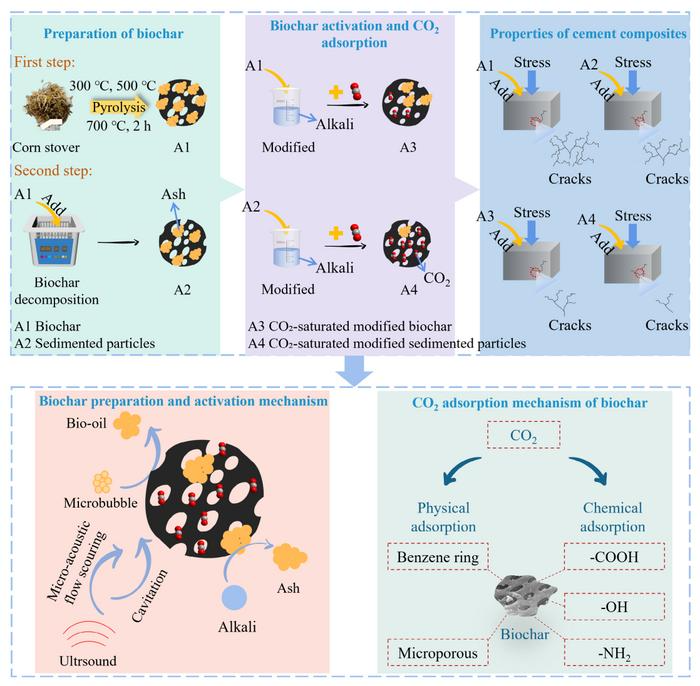A study team from Hefei University of Technology, Zhejiang University, and South China University of Technology revealed that adding carefully treated biochar to cement can significantly improve the material's ability to trap and store carbon dioxide while strengthening it.
 Investigation of the CO2 adsorption behavior of alkali-modified biochar components in cement composites. Image Credit: Binglin Guo, Ping Ye, Huyong Qin, Cheng Wang, Yang Liu, Yuyang Chen, Pengfei Bian, Di Lu, Lei Wang, Tongsheng Zhang, Weiping Zhao, Binggen Zhan & Qijun Yu
Investigation of the CO2 adsorption behavior of alkali-modified biochar components in cement composites. Image Credit: Binglin Guo, Ping Ye, Huyong Qin, Cheng Wang, Yang Liu, Yuyang Chen, Pengfei Bian, Di Lu, Lei Wang, Tongsheng Zhang, Weiping Zhao, Binggen Zhan & Qijun Yu
Cement production contributes significantly to global CO2 emissions. Finding cost-effective techniques to store carbon directly in building materials might reduce the industry’s environmental impact. The new study looked at how altering biochar, a porous carbon-rich substance derived from plant waste, could render cement more sustainable.
The researchers made biochar by heating corn straw at various temperatures and separating its principal component, sedimented particles. The original and divided biochar samples were treated with an alkali solution to improve structure and evaluated for CO2 adsorption. The researchers then mixed these biochars with cement in varied quantities to test their impacts on strength and carbon capture.
The study found that sedimented particles were more effective at trapping CO2 than untreated biochar. Alkali treatment also increased the material's pore structure. Biochar made at 500 °C performed the best overall, combining significant adsorption with increased cement performance.
When incorporated into cement, the CO2-saturated modified biochar increased the density and strength of the material, especially at a one percent replacement ratio. The research also revealed that the biochar primarily captures CO2 through physical adsorption, which takes place rapidly and effectively under standard conditions.
Adding CO2-saturated modified biochar to cement resulted in increased density and strength, especially at a one percent replacement level. The study found that biochar collects CO2 largely by physical adsorption, which is rapid and effective under normal circumstances.
In addition to increasing mechanical strength, biochar lowered the overall carbon footprint of cement mixtures. The researchers determined that the proper mix of biochar type, treatment, and dose can help change regular cement into a carbon-storing material while maintaining performance.
This work provides new insight into using biochar as a sustainable additive that supports carbon neutrality in the construction sector. By improving both strength and carbon sequestration, biochar-modified cement offers a practical step toward greener building materials.
Binglin Guo, Study Lead Author, South China University of Technology